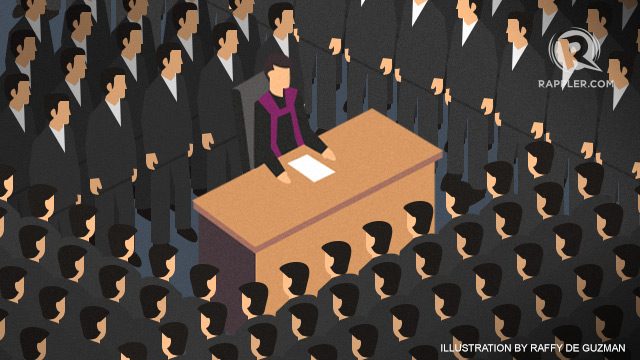SUMMARY
This is AI generated summarization, which may have errors. For context, always refer to the full article.

I have often been asked on nationwide television as well as in radio interviews to explain one legal concept or the other – the latest, on the writ of habeas corpus. I was told by my friend that one netizen had bashed me for proferring my opinions despite the fact that I am not a lawyer. He even went so far as to question my eligibility to be dean of a graduate school of law without being a member of the Bar. In the first place, I do not offer my opinions. I am asked for them, and an educator at heart never passes up an opportunity to educate. This is not the first time a challenge like this is hurled my way, but I am no longer flustered. What it does make clear, though, is that we have cultivated this deleterious mentality that treats disciplines like enclaves of professionals, jealous about the profit realized from the exercise of their professions.
Each year, our law schools churn out so many law graduates and the severity of the Bar Examinations notwithstanding, we really have more lawyers than we need, and not enough scientists. That is one reason that instead of putting qualified technocrats and skilled technical experts in government offices that need their expertise, our bureaucracy crawls with members of the Bar. I have every respect and regard for the profession. My father was an associate justice of the Court of Appeals. My mother has been a law dean. My brother is an RTC judge. I could have become a lawyer, even after being ordained a priest, but I did not want to. I chose not to. But the study of the law delighted me – which is why I worked for two doctorate degrees in the subject.
There is an elementary proposition that should not be too difficult to grasp: A jurist – one who engages himself in the scholarly examination of the law – need not be a lawyer, and a lawyer may not be a jurist, especially if his cases are confined to collection of a sum of money, accion reinvindicacion, forcible entry, unlawful detainer, and getting people off the hook when they issue bad checks!
A jurist is one for whom law is a science, not the trade of taking up the position of a client, and making money from the advocacy. Not that the jurist is spared the human lot of being in need of money, but he makes it by publishing, by lecturing and by teaching whomsoever may want to learn from him. The jurist is a theoretician. The lawyer is a tradesman; a craftsman. This is not to say that one is lowlier than the other, but it certainly is to say that we need both.

And that is the reason I am dean of a graduate school of law, the best that there is in the country, in fact. A graduate student of law is one who asks questions about the philosophy of the law, who asks what it is to be just – and examines the answers so far proffered in the history of thought, who scrutinizes the provisions of the law to find out whether or not they indeed serve the ends of justice, who inquires into the precepts that a reasonable interpretation of law should abide by, who asks about the coherence of the law, and the underlying reasons for incoherence, if any there might be. That is the gulf of a difference between a college of law and a graduate school of law. The first trains the lawyer; the second hones the critical cognitive skills of a jurist!
Justinian’s famed Corpus Juris Civilis did not necessarily flourish in the 6th century AD when he first promulgated it, after he had ordered the compilation of all extant laws and legal norms. It was rather in the Middle Ages, when the universities of Padua, Bologna, Paris, and others that dotted the intellectual countryside took it up as a distillation of quintessential Roman thinking on the law. It was jurists who made the Corpus flourish — and the result of their disputations were treatises, opusculae, pandects, and tomes.
Slowly, the work of academics – of jurists – found its way into the world of courts and law practitioners. Slowly, lawyers quoted the jurists and leaned on their authority. This is the reason that in the civil law system, “doctrine” is more highly regarded as a source of authority for courts and lawyers than precedent to which we, who have always had a fondness for things Americana – no matter that sometimes we speak nastily of their presidents – tend to rely on, rather inordinately. It is also to the cogitation of jurists that the Statute of the International Court of Justice refers when it points to “the writings of publicists” as a secondary source in the resolution of international legal disputes.
So, I am not a lawyer. I have not relished taking up other’s problems and making money from them. I do not have the title “Attorney.” If I were pathologically fixated to titles, I would be entitled to “Dr Dr Dr” – in the style of European professors – but I do not like what the nursery rhyme attaches to that iteration: “I am sick.” But I have always found delight in reading, study, disputation, teaching, writing and reflection.
We need more jurists in the Philippines – which is to say that we need more thoughtful people for whom law is the object of serious study, and its recondite problems, for which the lawyer may have very little time or interest – or talent, and for whom the philosophical and theoretical issues are to be taken up if the law is to be thoughtful, useful and just. After all, in many matters of supreme importance, there is often nothing more practical than a good theory. – Rappler.com
The author is Dean, Graduate School of Law, San Beda College; and Chair, Department of Jurisprudence and Legal Philosophy, Philippine Judicial Academy.
Add a comment
How does this make you feel?
There are no comments yet. Add your comment to start the conversation.